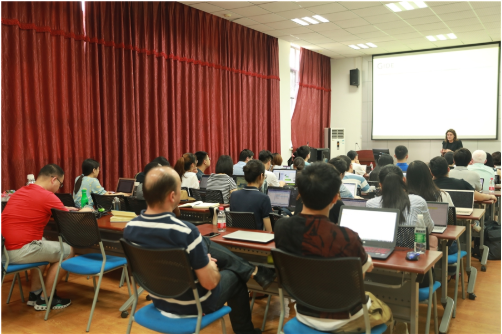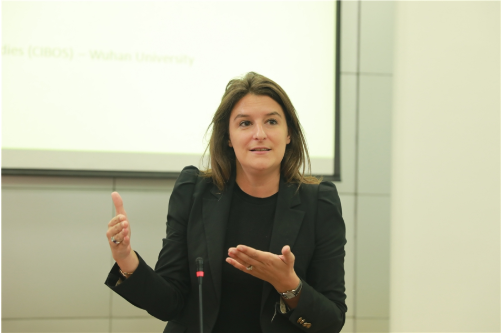From June 12th to 13th, Ms. Isabelle Rouche, a lawyer from the Paris Bar Association, visited Wuhan University China Institute of Boundary and Ocean Studies (CIBOS) and gave two lectures titled “Jurisprudence on Maritime Demarcation” and “The Dispute Settlement Mechanism under the UN Convention on the Law of the Sea”. Wu Wei from CIBOS hosted the lectures. Teachers and students from CIBOS and the Institute of International Studies (IIS) attended the lectures.

In the first lecture, "Jurisprudence on Maritime Demarcation", Isabelle elaborated on two aspects: delimitation methods and factors to be taken into consideration in the delimitation process. In the first section, Isabelle emphasized the importance of the fairness principle in demarcation. Then, Isabelle referred to the usual delimitation “three steps”: first, drawing roughly the middle line or the angle bisector; second, considering the status of the relevant marine features and its influencing factors; and third, according to the marine nature, making adjustments to the lines drew in the first step on the basis of the principle of fairness. Temporary equidistance lines have not always been the most preferred method in demarcation. In the explanation, Isabelle combined the relevant classic cases such as "Convention on the Law of the Sea," the "Meng-Memorial Case," the "Nicaragua v. Honduras," and demonstrated the specific demarcation method choices under different circumstances, and combined the cases to illustrate the superiority of the demarcation methods with advantages and disadvantages. For example, the demarcation method in the "Meng-Memorial Case" is concise and predictable. However, there are serious inequalities in areas where the length of the coastline is very different. The delimitation method in the case of Nicaragua v. Colombia is concise, but it is subjective in terms of the appropriate proportion of demarcation, and it is easy to violate the principle of fairness. In the second part of the content, Isabelle mainly introduced the influence of the geographical factors of the coastal sag islands and other related factors on the delimitation.

The second lecture, "Dispute Resolution Mechanism under the UN Convention on the Law of the Sea", is more practical. Isabelle first introduced the preparatory work needed before litigation, and briefly explained the different mechanisms and structures of the International Tribunal for the Law of the Sea (ITLOS), the International Court of Justice (ICJ) and the selection of arbitration under the arbitral procedures of Annex VII of the UN Convention on the Law of the Sea mechanism. In the case management section, Isabelle described how to proceed with the collection of evidence after receiving the case as an attorney. In addition, she also emphasized that it is extremely important to have a clear understanding of the agency’s appeals, the role of other party’s attorney and language’s implied attitude and position in the trial. Finally, Isabelle reviewed the personal experience in preparing for the demarcation from pleading preparation to trial debate. She stressed that the length of the pleadings and the details of the content of the complaint, the interaction with the judges in the trial process and the ability to respond to the court, all reflect the logical tightness of the senior legal person.
(Rewritten by Chen Panpan)
(Edited by Fu Shanshan)
In the discussion session, Isabelle discussed with teachers and students on demarcation method, sovereignty and maritime rights and interests by cases. At the same time, Isabelle encouraged students who are interested in international legal business to lay a firm foundation in theoretical knowledge of international public law, improve English proficiency and awareness of environmental law.
